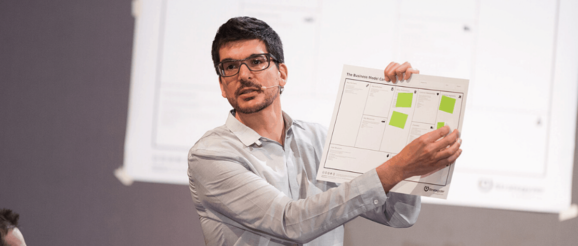Alex Osterwalder – 7 Things to Understand about Innovation

On 18 March, we hosted a Clubhouse discussion with Alex Osterwalder, one of the world’s leading innovation experts. Osterwalder shared several important points related to innovation and he also shared a few specific insights on business model innovation. Here, we list 7 key points we picked up from the conversation.
“If you want to transform, you need to think several decades ahead.”
First of all, Osterwalder mentioned that in order to be truly innovative, you need to think in the long-term. For truly transformative innovation, it’s not enough to think about minor improvements – you need to look further. He mentioned Tesla as a great example of this; while they are scaling their automotive business, they are already creating a new solar business. “Experimentation is in the DNA of Tesla. Love them or hate them, but you have to admit that they made a difference.”
“I believe the problem is often the lack of ability to scale new innovations.”
When asked about the difference between Apple and Nokia – why one succeeded and one didn’t – Osterwalder referred to this problem of scaling. “Nokia did many of the fundamentals of innovation right, but I think that it might have been the scaling where they really went wrong.” He highlighted that this is often the case; companies are great at innovating and they even might have great processes in place for that, but it’s the scaling where they fail. “Sometimes you need to scale the new innovations at the expense of your existing products. Innovation requires commitment.”
“The big challenge I see is that leaders lack commitment on innovation – they don’t give innovation power.”
For those familiar with Osterwalder’s work, you must have heard this before. He highlighted that the problem often is that especially in larger organizations, the innovation teams don’t have enough power. “A lot of companies do innovation theater, meaning that they have innovation activities but it doesn’t really lead to a lot of transformation.”
So, what leaders should really focus on is to commit to innovation, and make sure that the innovation teams have enough power in the organization. He mentioned that one practical way to do this is to have a Chief Entrepreneur working on the same level as the CEO.
“You don’t pick the winners, they will emerge.”
Osterwalder underlined multiple times that it’s crucial to understand that you can’t pick the winners. The right way to approach innovation is to create a funnel. First, you invest small bets on multiple projects and experiment on those. Then, based on the evidence you find, you pick the projects you continue experimenting on. Eventually, you will find those ideas and innovations you should invest in and start scaling.
“Innovation is risky when you make big bets, but it should never start with making big bets.” So, through this experimentation funnel, you can also control the risk of innovation.
“There are tons of examples of how business model innovation made the difference.”
Nespresso, iPod, Hilti, Ping An, and the list goes on. Osterwalder spoke about multiple examples of companies who actually transformed through business model innovation. For example, in the case of iPod, it was not only a technological innovation. By creating the iPod, they also created “gravity” as changing the device would have created switching costs for the user. “Leaders need to understand business model innovation and invest in it.”
“You need to transcend industry boundaries.”
According to Osterwalder, many people think that business model innovation always cannibalizes your existing portfolio. But, he highlighted that it’s not the case; it’s also possible to make a switch without cannibalizing your existing portfolio. What Osterwalder advised you to think about was to transcend industry boundaries. “You can build on what you have, and you can expand into something new.”
“It’s not easy, but it can be done.”
Osterwalder pointed out a few times that he knows this is not easy. And it’s definitely easier said than done. However, the good news: “innovation can be learned”.
According to Osterwalder, most companies have creativity and ideas already in their company. Most of the time the key to success would be to build a system to harness those ideas into transformative projects. “You need to build an ecosystem in your company where you experiment and allow people to fail.”
“I think innovation is a profession.” It’s about learning the basics and then building a system. “What you need to do as a leader is to commit and seriously invest.”
Join Gary Hamel, Lisa Bodel, Seth Godin and Paul Polman and 1,000 other business leaders at our Online Bootcamp, April 22, 2021!
